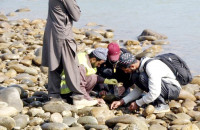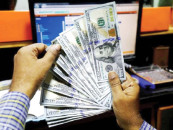Victory celebration and reality check
It's time to turn triumph into transformation, sustainable efforts to address domestic woes

Pakistani luck is flying these days. It has been blessed with massive success, one after the other. First, Pakistan successfully and comprehensively defeated India in the military conflict. It was an enormous triumph, which laid the foundation for a regional reset. India, which had portrayed itself as the regional power, a rising market and economy in Asia, and a leader of the Global South, had to face a checkmate at the hands of Pakistan.
Second, on the diplomatic front, Pakistan achieved many accomplishments. After the war, India sent a delegation to the world to launch a propaganda campaign. It wanted to tag Pakistan with terrorism. Pakistan analysed the situation and sent its own delegation, which outperformed the Indian delegation. The world did not buy the Indian argument, and the Pakistani point of view had wider acceptance.
Pakistan maintains a balanced relationship with the world's major powers, including China, the United States, and Russia. There is no need to discuss the China-Pakistan relationship, as everyone is aware that both countries share a deep and enduring brotherhood. However, the recent shift in the Pakistan-US relationship is the talk of the town.
The US played a prominent role in halting the war between India and Pakistan. After the truce, President Trump praised Pakistan for its sensible and rational behaviour. He also invited Army Chief General Asim Munir for a meeting at the White House. Both sides reportedly discussed enhancing the relationship in multiple fields.
On the other hand, Pakistan and Russia intensified efforts to further enhance and strengthen their bilateral relationship. Russia has shown interest in investing more than $2 billion in reviving and expanding Pakistan Steel Mills. It is a good omen, as Pakistan was looking for opportunities to revive the mill. Also, a breakthrough happened at the SCO defence ministers' meeting, where Russia supported Pakistan's stance on terrorism.
Simultaneously, Pakistan played a prominent and leading role in ending the Iran-Israel war. It diligently convinced the US administration that the war in the region had no justification. Therefore, all efforts must be made to end the war and work for peace.
These examples collectively indicate that Pakistan has achieved significant success in recent months. However, the country needs to be cognizant that these achievements cannot be sustained without solving domestic challenges.
Pakistan continues to face multiple challenges. The economic and governance system is in shambles. The government claims that the economy is improving and that the budget will provide a foundation for accelerated economic growth and development, as promised the previous year. But the Economic Survey 2024-25 and the budget for 2025-26 present a bleak picture.
The Economic Survey shows that the national GDP grew at a 2.7% rate. However, independent sources are not willing to accept government claims and instead raise questions. They question that, during the first three quarters of FY25, the economy grew at an average annual rate of 1.7%. To achieve a yearly rate of 2.7%, the economy would have had to grow at 5.3% during the last quarter, which is not possible.
Apart from that, agriculture, which had provided a significant boost to economic growth in FY24, presented a dismal picture in FY25. A booming sector experienced a sharp decline in production and market share. The growth rate fell to 0.56% in FY25 from 6.25% in FY24, driven by a steep fall in the growth of major crops. Major crops' growth rate fell to -13.26% in 2025, from 11.3% in 2024. Similarly, the large-scale industry is struggling to enter a positive growth trajectory, having demonstrated a negative growth of -1.7%.
Social indicators too are pretty disturbing. The World Bank estimates that 44.7% of the population lives below the poverty line, and 16.5% of the population resides in extreme poverty. Poverty is increasing, despite the government's assertions of investing in poverty reduction such as the Benazir Income Support Programme (BISP). This raises questions about the effectiveness and sustainability of the BISP.
Food insecurity is another constant irritant, and a 2013 study estimated that 58.8% of the population in Pakistan was food insecure. Unfortunately, we have to rely on old data because the government has not updated it. There are fears that food insecurity has increased over the years due to multiple factors.
Poor economic conditions and the devaluation of the PKR have substantially impacted people's purchasing power, resulting in fewer resources available to afford healthy food. Additionally, inadequate governance and management of the agricultural sector have led to lower production and reduced availability of quality food.
Bad governance is further complicating the situation. The elite class has designed the institutions to ensure the exclusion of common citizens from the governance system without explicitly mentioning it. The system encourages wealth accumulation, and there is no system in place for redistributing wealth or resources. It is deepening the divide between the haves and have-nots. A few influential individuals have all the resources, while millions struggle to make a decent living.
Furthermore, the elite have devised an extremely complex business system and environment to strengthen their control over the economic system and resources. This system has given birth to rampant corruption and deep-rooted rent-seeking behaviour. It only works for the powerful or those who can afford to offer bribes.
Environmental degradation, particularly climate change, is another issue that is worsening over time. Climate change-related disasters, such as floods and droughts, are regular visitors. Pakistan is still struggling to recover from the impacts of the 2022 floods, and there is a prediction that Pakistan will again face floods.
On the other hand, climate change is severely impacting agriculture, which is threatening Pakistan's food security and economy. Farmers are bearing the brunt of climate change. Poor governance and attitude of the government have left farmers vulnerable to the impacts of climate change. In conclusion, Pakistan needs to be mindful that its heyday can be limited if it does not address these issues.
The writer is a political economist and a visiting research fellow at Hebei University, China























COMMENTS
Comments are moderated and generally will be posted if they are on-topic and not abusive.
For more information, please see our Comments FAQ